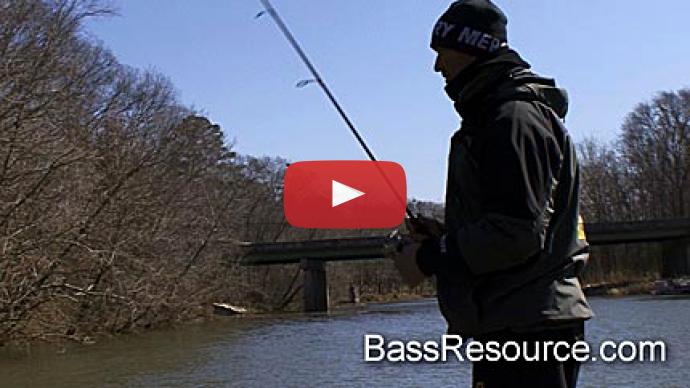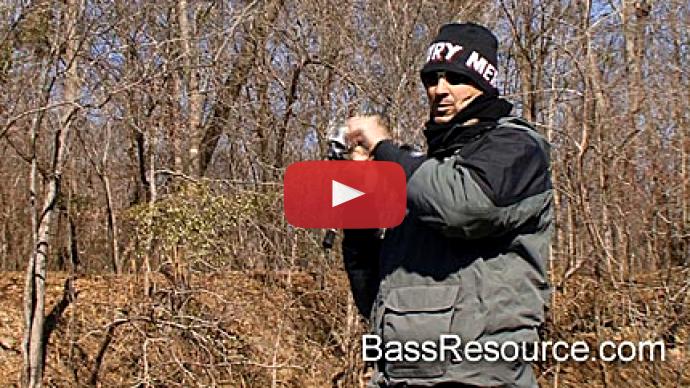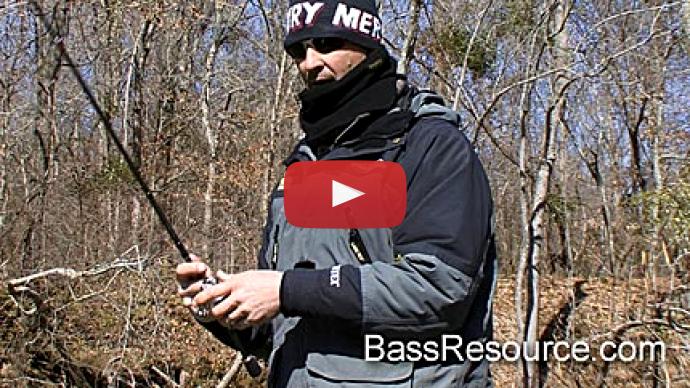In this episode, Gerald tells us how he got his start, gives tips on becoming a pro, and tells us whether or not his surgeries have any effect on his performance.
Glenn: Hey Bass Resource fans. Glenn May here and a little while ago, we asked you to send in the questions you would ask Gerald Swindle if you had a chance to sit down with him one-on-one. Well, the G-Man was up to the task and he even invited us out for a day on the water while he practiced for yet another Bassmaster Classic appearance. Here now are the uncensored answers to the questions you asked Gerald Swindle.
Now Gerald, there are several guys on the forum who want to know how you got your start and how'd you get from there to where you are today.
Gerald: Well, I mean, getting my start was kind of a gift from my dad. We fished growing up, that's all we done as hobbies. We either hunted or fished. We didn't have a lot of money, so there wasn't a lot of vacations. Matter of fact, none to Disney. But as a family we just kind of stayed outdoors and, I don't know, he fished tournaments growing up and I can remember him fishing some of the very first BASS tournaments so fishing was in my blood early, through either my granddad and him and after I got out of school, I was framing houses and working.
Started winning a little money fishing these little night tournaments, little Tuesday nighters and Thursday nighters and I knew right then, if I could make money with a rod and reel I was going to put that hammer down, and that's just about how the whole thing developed. It wasn't a big master plan, it was just an eye-opening experience that I actually fished a little five hour tournament and got paid for it, so I was like, well, if you can do it once, you can do it again. And it took several years.
That wasn't something that come easy, you know? I took a lot of beatings. I mean, we did win a little money but, man, locally, I fished and fished and fished for years and then it got to where, you know, my home lake Smith Lake, Logen, and Lay, and all them lakes, they got really competitive. On a local level, I won a lot. Well, as much as you can win locally, you know? Staying in the money and I made that next step to regional, then when I left there, I made the step into the open.
Man, it was just slow ladder, but the key is, if you're not a strong force locally, then it's going to be hard to make it on a top level. You need to be really, really catching them locally to make that next step to regional. And then you need to be holding your own regionally before you make the step into the big leagues. And once I got qualified for the Tour, there were still a lot of bumps in the road and it was an uphill battle but we made it.
Glenn: What was the defining moment where you decided that this is it? I'm going to be a pro angler?
Gerald: I think I knew growing up, once I started winning money I wanted to be a pro, but the defining moment of my whole career when I knew I could do it and stay out here was when I won Beaver Lake, the FLW series. The very first FLW they ever had that paid $150,000, I won it on Beaver Lake and that was the turning point, where I knew financially then, I had enough money to stay out here and the sponsors starting really showing up then and without a doubt I knew even from that day on, even driving back that 10 hour drive home, I knew that this is where I'd spend the rest of my life, was in the front of a boat.
Glenn: So Bass Fishing Magician writes what do you think is the best way for a young anglers to reach their ultimate goal of becoming a pro?
Gerald: For a young angler to become a pro, there's a couple simple steps. Now, in this day and time, it's different. The first biggest step for a young guy, you got to complete college. You got to at least do two years, get a business, study some marketing, because there's so much more involved in fishing than just catching them. You're selling yourself constantly, so a little college education, that'll prepare you for the business world, the number game, what contracts can be. So that's your first step.
Then you're second step is time on the water. Time on the water. You got to sacrifice everything else you love to do, concerts or the beach, all that comes second. On the water's number one, so at least two years in a college and then a lot of time on the water. And that's the best way I know to get to be in the top level.
Glenn: Well, Big Bass Mosa, he asks at what point can you say you're competitive enough at your current level and maybe think about the next step up? At what point do you think you should move on?
Gerald: I think that's an easy one to answer. Everyone wants to know when they should move on. If you're fishing locally, and you're in the top five 85% of the time, 90% of the time, local tournaments you're in the top five, you're ready for the next step. If you're not, if you're just winging around outside the money, you don't need to make that step because there's better competition up in front of you until you're extremely strong locally and you can stay in the money almost all the time, you don't need to make that step.
Glenn: There's a guy in our forum named V Dubb and he asks, 'If you were starting all over again, never having fished a tournament in your life, where would you begin?'
Gerald: If I had to start all over again, never fished a tournament in my life, I guess the first thing to do, and the only way to get started in, you'd have to join a club. You'd need to join a bass club because you got so much to learn by never fishing a tournament. Joining a club is going to put you surrounded by guys that you can learn from and then you just have to be the human sponge. Everything in the club, you have to soak it up. So joining a club, baby. That's an easy one.
Glenn: Well, Balsabaiter, don't you love the names of some of these guys? Doesn't anybody use their real name? Balsabaiter, he wants to know about your back. He knows you've had several back injury. A lot of people have asked about this. Your back surgeries. But he asks, he wants to know how much you attribute your back injuries to the pounding you've taken in the bass boat and what steps you're taking to protect your back while fishing and driving in a boat in big water.
Gerald: It's weird, you know? I am one of the few guys out here at my age that's had five back surgeries and still lives a very fruitful and wild life, you know? I don't, there's not much I don't do right now. If I want to sit, I deer hunt and I hang tree stands and I drag deer. I live a 100% active life even though I've been opened up five times. Did I get hurt in a boat? No. Did riding in a boat contribute to them? No. The first two were work related. The next one I was swinging a golf club and herniated two discs at the same time. So, you know, very few times has it been contributed to being in the boat.
Once you start having back problems, it natural that it starts to degenerating and it's just something that happens. But there's keys to getting back on your feet. The biggest thing is you've got to want to. So many people get a back injury and want to lay down and quit. And say oh, you know, this and that. That's a bunch of bull crap. If you want something bad enough, you'll get up and fight again. I just wasn't a guy to let the doctor tell me. And they made them same speeches, you shouldn't do this and you shouldn't do that but, you know, you shouldn't do a lot of stuff.
You shouldn't date ugly women but people do it, so I wouldn't tell a guy to listen to the doctor. I have dreams and aspirations and I wasn't going to let an injury stop that. And then I started making progress in knowing how to keep myself stronger and prevent it. When I'm home, at least three to five days a week, I'm in the gym at 6 a.m. I'm doing pull up after pull up after pull up, a couple hundred crunches, push ups. I mean, I'm steadily in the gym. I run about two and a half, three miles a day. I do stadiums and wind sprints. I'm constantly pushing my body to be stronger and stay healthy because the key to keeping your back healthy is your abs and most people won't do that.
That's why you won't see a seat up here. I don't want any bad body posture. I don't wear any kind of brace. I want my abs to be strong as I can get them at all times. That's just a few of the ways that I do it but living healthy, staying in the gym, but I can't tell you that I don't have any pain. I have days where man, I'm miserable. Riding in the boats, it can be a brutal, brutal rough ride and then there's things you have to do.
I've got a company that's out of the area I live in called TPS and it's a company called Total Pain Solution and they make transdermal medicine. So what it is, it's like a high, high anti-inflammatory but you don't take it orally. I can rub it in the areas I'm hurting, which enables me during the day, if I have really sore back problems, take the cream out. I can rub it in that area. You'd be surprised, it's so much less invasive on my stomach when we don't eat. So there's ways to do it man.
Look into that, if you guys are hurting, look into a company like TPS that makes creams, makes steroid creams, makes anti-inflammatories. Help keep that pain down where you can get yourself in shape. Once you get in shape, it's a lot easier to stay there.
Glenn: I guess this is a follow up then. AJ wants to know if reaching the age of 40 has changed the way you fish tournaments?
Gerald: Well, it's kind of weird. When I turned 40, I had made a goal when I was about 6 or 7 months before I turned 40, I told my wife I was going to have a six-pack when I turned 40 and I really started training just for that. To try and turn 40 and I got it really close, my shoulder started bothering me. Both of my shoulders have been rebuilt. Both of them have been operated on. And one of my shoulders started bothering me, so I had to quit pushing so much weight. I did more cardio, but I didn't have a six-pack when I turned 40, but I did have a four-pack and I was probably in the best shape of my life when I turned 40. So it really hasn't affected nothing. I feel like I'm 30 years old, hadn't changed anything.



